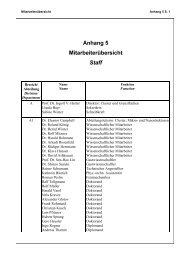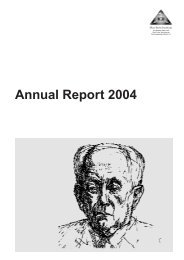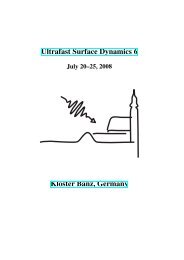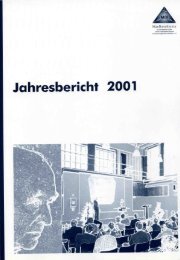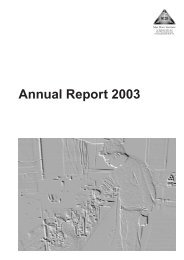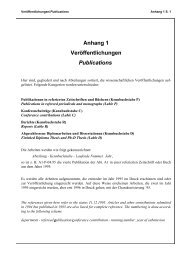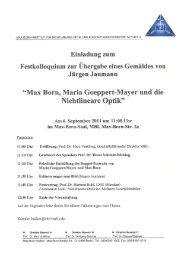You also want an ePaper? Increase the reach of your titles
YUMPU automatically turns print PDFs into web optimized ePapers that Google loves.
Fig. 25<br />
Robert Oppenheimer, one time Ph. D<br />
student of <strong>Max</strong> <strong>Born</strong>.<br />
Fig. 26<br />
<strong>Max</strong> <strong>Born</strong> accompanied by Maria Göppert and Viktor<br />
Weisskopf in Göttingen (photograph reproduced by courtesy<br />
of AIP Emilio Segrè Visual Archives, a gift from Jost<br />
Lemmerich).<br />
lopment, and I have no doubt that my father’s message was to the effect that he would not<br />
participate. I also recall a review in The Listener, at that time the house journal of the BBC, of<br />
Robert Jungk’s book Brighter than a Thousand Suns which gave the first coherent account of<br />
the development and dropping of the atomic bombs. The claws of my memory have kept a firm<br />
grip on the following sentence. “Of all the brilliant men that parade through these pages only<br />
one, <strong>Max</strong> <strong>Born</strong>, refused from the start to have anything to do with the devilish invention”. I am<br />
particularly proud of him for that!<br />
With this in mind, great interest attaches to <strong>Max</strong> <strong>Born</strong>’s relationship with Robert Oppenheimer<br />
[25], who joined <strong>Max</strong>’s <strong>Institut</strong>e in Göttingen in 1926 and during the War became Director of<br />
the Manhattan Project which produced the first atomic bombs. Göttingen was an exciting and<br />
exhilarating environment for Oppenheimer and the other brilliant young men working with <strong>Max</strong><br />
<strong>Born</strong>, because their first papers on quantum mechanics were just appearing. In November 1926<br />
Oppenheimer wrote to his friend Francis Ferguson: “The science [in Göttingen] is much better<br />
than at Cambridge, and on the whole probably the best to be found”. In his contribution to a<br />
Festschrift for Oppenheimer’s sixtieth birthday <strong>Max</strong> refers to the <strong>Born</strong>-Oppenheimer approximation,<br />
their most important work together, and makes complimentary comments; <strong>Max</strong> clearly<br />
recalled their collaboration as entirely enjoyable. That is interesting, because it sheds light on<br />
my father’s ability to empty his memory of unpleasantnesses. An anecdote from Oppenheimer’s<br />
Göttingen period shows him as a somewhat conceited young man, whose brashness caused<br />
trouble in the famous weekly seminars on the atom by dominating the discussion to the detriment<br />
of the other young participants, Heisenberg, Fermi, Teller, Weisskopf, Maria Göppert [26]<br />
– not people lightly ignored. After a while they complained, in writing. <strong>Max</strong> put their letter on<br />
his desk in such a way that Oppenheimer could not fail to see it when he came to talk about<br />
his thesis. The ruse worked and the interruption ceased. However, thinking that Oppenheimer<br />
<strong>Max</strong> <strong>Born</strong> • Gustav <strong>Born</strong> 15



